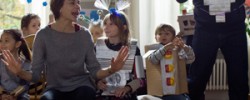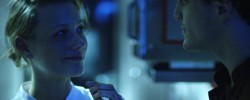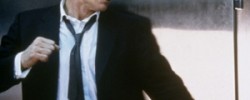
The Prequel Problem

Editor’s Notes: Monsters University opens in wide release Friday, June 21st.
Providing the major marketplace original content is an ever growing struggle. The phrase “based on”, regardless of the words that follow, is ubiquitous in media and has begun to feel downright lazy. The independent market is constantly pushing against the recycling of ideas, but big studios hear “pre-established audience” and see dollar signs. The terms reboot and sequel, or heaven help us, threequel, are met with just as much apprehension as excitement; for every Spider-Man 2 and Toy Story 3 there are twice as many Batman & Robin and Spider-Man 3. The only thing more fickle than the sequel may be the prequel. Soon even the critically beloved Pixar, Cars franchise notwithstanding, who waited four years before apprehensively entering the sequel game is making the trek into prequels with Monsters University. While we wait to see if Pixar is able to traverse the rocky prequel road it wouldn’t hurt to understand just what makes them so hard.
The world of prequels is a world of restriction. When you approach a sequel you have a film with room to spread out. Many of the characters are established, so not as much time needs to be spent bringing the audience into the fold. There is no clear end game in mind, which allows the characters to interact more naturally. This is our first issue. Your main characters in a prequel are known entities. We are aware of where their life will take them, so it is a bit of a waiting game to see how that will pan out. The story can either chain itself to this rigid eventuality or choose to explore another avenue. Either way, a prequel that focuses on a character’s growth and looks to tell us how this person became who we know is doomed from the start. It boils down to the Titanic problem. A basic knowledge of history tells the viewer that the ship will sink. Instead of focusing on the actual sinking of the ship, the film finds its success by revolving around a doomed love story. The anticipation of the iceberg collision is minimal, so Cameron uses the sinking as a device to communicate the frailness of the characters’ affair. Mix that with a belting Celine Dion and you get a theater full of misty eyes.

If a prequel hews too closely to its source it is crippled from the start. In this case it is best to look at current television. Hannibal and Bates Motel premiered within a month of each other. Both based on renowned films, Silence of the Lambs and Psycho, they are both set before the events of their respective sources. Bates Motel plays like Hitchcock light. The series doesn’t bring new ideas or style to the table to make this series distinctly its own, whereas Hannibal is able to establish a very specific atmosphere. Under the gaze of creator Bryan Fuller Hannibal has a voice that is distinctly its own. The characters and stories are not tied to the place that its characters will eventually arrive. A successful prequel must be able to stand on its own. Taken by itself, Hannibal is a show that works with or without the knowledge of its source, while Bates Motel’s mining the depths of Norman’s psychosis has a short track on which to walk.
These prequel problems can be boiled down to a set of rules by which to abide. First, have a purpose. Now this cannot simply be to make more money, I’m sorry studios. There should be a story that needs to be told; without a story and purpose there is no need for the film to exist. Secondly, build on the source material. The reason for a prequel is to spend more time with the characters you know and ultimately develop an understanding of who they are. If your story can exist on its own without ties to a previously established film, then there is no reason to lash it to the property, see exhibit Prometheus. Thirdly, do not explain everything. Mysteries are not a bad thing. If an element of back-story can be organically revealed and is germane to the story, then by all means indulge yourself, otherwise you are pandering to a fandom who will most likely not appreciate the answers that are provided, e.g. midi-chlorians. Fourthly, ensure that you stay true to the heart of the original. The desire for prequels is birthed from a place of love. We want to spend more time in this world and with this people, so drastic changes in the way known characters act, or how the surrounding universe functions is off-putting. Lastly, ensure that you are making a good product. A bad film is a bad film is a bad film, no matter how beloved its source may be, I’m looking at you Star Wars Episodes I-III.
There are a bevy of successful prequels. The Good, the Bad and the Ugly is easily the best entry in the Dollars Trilogy and the prequel sections of The Godfather Part II earned Robert DeNiro an Academy Award. The true problem with the prequel is that it often does not face the same restrictions of standalone films. While the sequel can grow both in story and breadth, the prequel is placed in a world of limitations and expected to produce a similar result. Pixar has shown themselves to be quite adept at producing sequels with not one but two successful follow-ups to Toy Story. With a philosophy that proudly places story on the pedestal that it deserves, Pixar appears to have the pieces in place for a successful prequel in Monsters University. Let’s hope it’s more X-Men: First Class than X-Men Origins: Wolverine.
Related Posts
Derek Deskins
Latest posts by Derek Deskins (see all)
- Review: White House Down (2013) - June 28, 2013
- Review: The Heat (2013) - June 27, 2013
- Review: A Band Called Death (2012) - June 27, 2013
-
http://theatertomyself.tumblr.com/ Derek Deskins
































